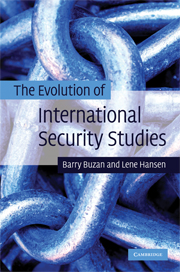Book contents
- Frontmatter
- Contents
- Foreword
- List of abbreviations
- List of figures
- List of tables
- Introduction
- 1 Defining International Security Studies
- 2 The key questions in International Security Studies: the state, politics and epistemology
- 3 The driving forces behind the evolution of International Security Studies
- 4 Strategic Studies, deterrence and the Cold War
- 5 The Cold War challenge to national security
- 6 International Security Studies post-Cold War: the traditionalists
- 7 Widening and deepening security
- 8 Responding to 9/11: a return to national security?
- 9 Conclusions
- References
- Author Index
- Subject Index
7 - Widening and deepening security
Published online by Cambridge University Press: 05 June 2012
- Frontmatter
- Contents
- Foreword
- List of abbreviations
- List of figures
- List of tables
- Introduction
- 1 Defining International Security Studies
- 2 The key questions in International Security Studies: the state, politics and epistemology
- 3 The driving forces behind the evolution of International Security Studies
- 4 Strategic Studies, deterrence and the Cold War
- 5 The Cold War challenge to national security
- 6 International Security Studies post-Cold War: the traditionalists
- 7 Widening and deepening security
- 8 Responding to 9/11: a return to national security?
- 9 Conclusions
- References
- Author Index
- Subject Index
Summary
The previous chapter showed how traditionalists repositioned themselves after the end of the Cold War and how they argued that their military, state-centric agenda had in no way been harmed. Yet this claim was not universally accepted by ‘wideners’ and ‘deepeners’, some of whom grew out of positive Peace Research, Poststructuralism and Feminism (laid out in chapter 5), and some of whom came to ISS as the Cold War ended. To those seeking to expand the concept of security, the narrowness of the military state-centric agenda was analytically, politically and normatively problematic. Such things as the peaceful ending of the Cold War, the growth in intra-state conflicts, Western societies' fear of immigration, the decaying environment and the acceleration of the HIV/AIDS epidemic demonstrated that traditionalism was unable to meet the challenges of the post-Cold War era. Moreover, wideners and deepeners held that the 1990s failed to produce a constitutive military event or a defining great power problematic that traditionalists could claim should take centre-stage.
To challenge military-state centrism was, of course, not new, but what reconfigured the terrain of ISS in the late 1980s and 1990s was that challengers were no longer identified as ‘Peace Researchers’ – and thus as having a particular political position on the contested academic and political landscape of the Cold War – but as people doing Security Studies or IR. Some more specific labels – Poststructuralism and Human Security in particular – were politicised within ISS, but this rarely translated into broader non-academic circles, as Peace Research had done.
- Type
- Chapter
- Information
- The Evolution of International Security Studies , pp. 187 - 225Publisher: Cambridge University PressPrint publication year: 2009
- 5
- Cited by



